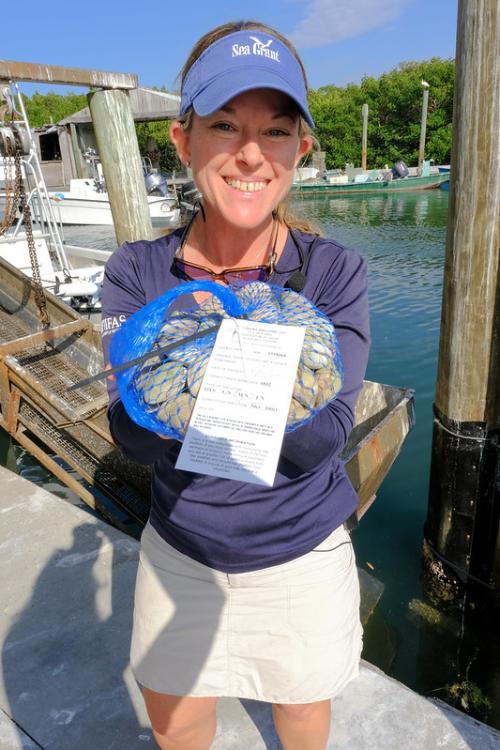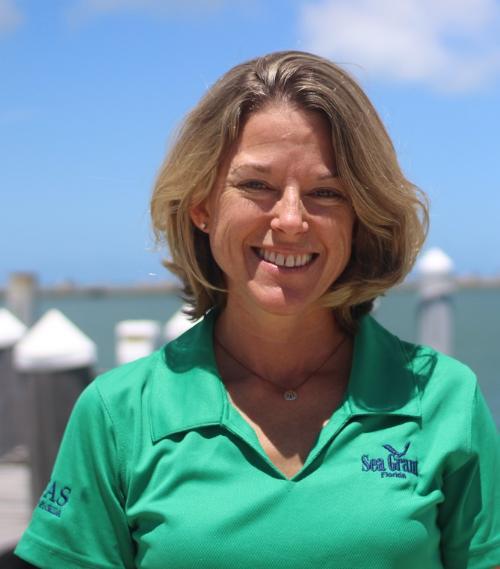Angela Collins
Assistant Extension Scientist
Angela Collins joined the University of Florida IFAS School of Forestry, Fisheries, and Geomatic Sciences and the UF/IFAS Tropical Aquaculture Laboratory in 2023 as an Assistant Extension Scientist. Her research and extension programs focus on Florida’s marine fisheries and bivalve shellfish aquaculture industries. Angela works primarily with recreational anglers, commercial seafood producers, and bivalve shellfish growers to encourage science that will benefit coastal economies and environments and promote best practices that will support local sustainable fisheries. In addition to engaging directly with industry, she coordinates with agencies, non-profit organizations, and other academic partners to promote cooperative research that serves Florida’s fisheries stakeholders. She currently serves as a marine fisheries and shellfish aquaculture specialist for Florida Sea Grant and is an active member of their Fisheries and Aquaculture Work Action Groups. Current research and extension interests include barotrauma mitigation for reef fishes, ecosystem services of shellfish aquaculture, local seafood production, and promotion of working waterfronts.
Prior to arriving at TAL, she was based in Manatee County as a Florida Sea Grant Agent with UF/IFAS Extension. She also spent over a decade as a marine fisheries biologist with Florida Fish and Wildlife Conservation Commission, where she specialized in cooperative research with divers and anglers to collect data about reef fish including hogfish, Goliath grouper and Gag grouper. She spent time early in her career as a science diver with the Louisiana Universities Marine Consortium, as an aquarist with Walt Disney World, and as a biologist studying cownose rays with Mote Marine Laboratory.


CONTACT
UF/IFAS Tropical Aquaculture Laboratory
1408 24th Street SE
Ruskin, FL 33570
abcollins@ufl.edu
813-671-5230 x115
-
Education
Ph.D., Integrative Biology, 2014, University of South Florida
M.S., Biology, 2005, University of South Florida
B.S., Marine Biology, 1999, Florida Atlantic University
-
Current Students
Leonardo Eguia - M.S. Student (Committee Member)
Gabrielle Foursa - Ph.D. Student (Co-Chair)
Amelia Missavage - MFAS Student (Chair)
Clark Morgan - Ph.D. Student (Committee Member)
-
Former Students
Jose Ordonez Montoya - M.S. Student (Committee Member)Fred Shopnitz - M.S. Student (2020) (Committee Member)Meaghan Emory - M.S. Student (2019) (Committee Member)Ian Towne - M.S. Student (2018) (Committee Member)
-
Selected Research Publications
For the most recent publications, please visit Angela's Google Scholar Profile.
Ray, B.C., C.A. Murray, O.I. Markham, C.N. Patmagrian, C.L. Ohs, J.T. Patterson, A.B. Collins, and M.A. DiMaggio. 2025. Evaluation of calcein marking protocols for Hogfish. North American Journal of Fisheries Management 45(4):684-693.
Read HereMurray, C.A., N.E. Evans, C.L. Ohs, J.T. Patterson, A.B. Collins, and M.A. DiMaggio. 2025. Developing larval nutrition protocols for Hogfish, a new candidate for marine finfish aquaculture. North American Journal of Aquaculture 87(2):77-89.
Read HereRay, B.C., C.A. Murray, O.I. Markham, C.L. Ohs, J.T. Patterson, A.B. Collins, and M.A. DiMaggio. 2025. Characterizing Hogfish salinity tolerance for the development of low-salinity culture protocols. North American Journal of Aquaculture.
Read HereCollins, A.B., B. Fluech, Z.A. Siders, M. Sipos, and A. Zangroniz. 2025. Diving for data: Florida Sea Grant's great goliath grouper count. Oceanography 37(1).
Read HereKaczor, K. R.A.A. Alegado, K. Hintzen, L. Ching, M. Lieberman, S. Chang, E. Nakano, A. Sy, D. Horio, K. Tam, V.R. Nerurkar, A. Smyth, A. Collins, K. Fallon, F. Focazio, and S. Kreisler. 2024. Rising together in response to the Covid-19 pandemic. Oceanography 37(1):12-18.
Read HereCarroll, J.L., R.D. Ellis, A.B. Collins, and D.J. Murie. 2023. Dorsal fin spines and rays as non-lethal ageing structures for Goliath Grouper Epinephelus itajara. Fishes 8:239.
Read HereShopnitz, F.A., C.L. Ohs, E. Silvy, J. Broach, M.A. DiMaggio, J. Patterson, and A. Collins. 2022. Evaluation of anesthesia protocols for handling Hogfish Lachnolaimus maximus using tricaine methanesulfonate and AQUI-S 20E®. North American Journal of Aquaculture 84:304–312.
Read HereTowne, I.A., P.T. Arena, A.B. Collins, and D.W. Kerstetter. 2021. Habitat specific tradeoffs in growth and survival by Hogfish Lachnolaimus maximus in southeast Florida. Bulletin of Marine Science 97(3):427–440.
Read HereFriess, C., S. Lowerre-Barbieri, G.R. Poulakis, N. Hammerschlag, J.M. Gardiner, A.M. Kroetz, K. Bassos-Hull, J. Bickford, E.C. Bohaboy, R.D. Ellis, H. Menendez, W.F. Patterson III, M.E. Price, J.S. Rehage, C.P. Shea, M.J. Smukall, S. Walters-Burnsed, K.A. Wilkinson, J. Young, A.B. Collins, +17 others. 2021. Regional scale variability in the movement ecology of marine fishes revealed by an integrative acoustic tracking network. Marine Ecology Progress Series 663:157–177.
Read HereKendall, M.S., B.L. Williams, R.D. Ellis, K.E. Flaherty-Walia, A.B. Collins, and K.W. Roberson. 2020. Measuring and understanding receiver efficiency in your acoustic telemetry array. Fisheries Research 234:105802.
Read HereEllis, R.D., K.E. Flaherty-Walia, A.B. Collins, J.W. Bickford, R. Boucek, S.L. Walters Burnsed, and S. K. Lowerre-Barbieri. 2019. Acoustic telemetry array evolution: from species- and project-specific designs to large-scale, multispecies, cooperative networks. Fisheries Research 209:186–195.
Read HerePratt, H.L. Jr., T.C. Pratt, D. Morley, S. Lowerre-Barbieri, A.B. Collins, J.C. Carrier, K.M. Hart, and N.M. Whitney. 2018. Partial migration of the Nurse Shark, Ginglymostoma cirratum (Bonnaterre), from the Dry Tortugas Islands. Environmental Biology of Fishes 101:515–530.
Read HereCollins, A.B. and P.J. Motta. 2016. A kinematic investigation into the feeding behavior of the Goliath Grouper Epinephelus itajara. Environmental Biology of Fishes 100:309-323.
Read HereCollins, A.B., L.R. Barbieri, R.S. McBride, E.D. McCoy, and P.J. Motta. 2015. Reef relief and volume are predictors of Atlantic Goliath Grouper presence and abundance in the eastern Gulf of Mexico. Bulletin of Marine Science 91:399–418.
Read HereSeyoum, S., A.B. Collins, C. Puchulutegui, R.S. McBride, and M.D. Tringali. 2015. Genetically determined population structure of Hogfish (Labridae: Lachnolaimus maximus) in the southeastern United States. Fishery Bulletin 113(4): 442–455.
Read HereCollins, A.B., and R.S. McBride. 2015. Variations in reproductive potential between nearshore and offshore spawning contingents of Hogfish in the eastern Gulf of Mexico. Fisheries Management and Ecology 22:113-124.
Read HereSimmons, C.M., A.B. Collins, and R. Ruzicka. 2014. Distribution and diversity of coral habitat, fishes, and associated fisheries in U.S. waters of the Gulf of Mexico, in Interrelationships Between Corals and Fisheries, S. Bortone, ed., CRC Press, Boca Raton, FL. 3:19-37.
Read HereCollins, A.B. 2014. An investigation into the habitat, behavior and opportunistic feeding strategies of the protected Goliath Grouper Epinephelus itajara. PhD Dissertation, University of South Florida, Tampa, Florida.
Read HereSeyoum, S., M.D. Tringali, B.L. Barthel, C. Puchulutegui, M.C. Davis, A.B. Collins, and M.T. Craig. 2013. Isolation and characterization of 29 polymorphic microsatellite markers for the endangered Atlantic Goliath Grouper (Epinephelus itajara), and the Pacific Goliath Grouper (E. quinquefasciatus). Conservation Genetics Resources 5:729-732.
Read HereSeyoum, S., M.D. Tringali, B.L. Barthel, C. Puchulutegui, M.C. Davis, A.B. Collins, and R.S. McBride. 2012. Twenty-nine polymorphic microsatellite loci for the genetic management of captive-bred Hogfish (Lachnolaimus maximus) and assessments of globally declining natural populations. Molecular Ecology Resources 12(4):779-781.
Read HereCollins, A.B., and R.S. McBride. 2011. Demographics by depth: spatially-explicit life history dynamics of a protogynous reef fish. Fishery Bulletin 109(2):232-242.
Read HereHeupel, M.R., B.G. Yeiser, A.B. Collins, L. Ortega, and C.A. Simpfendorfer. 2010. Long-term presence and movement patterns of juvenile Bull Sharks in an estuarine river system. Marine and Freshwater Research. 61(1):1-10.
Read HereCollins, A.B. 2009. A preliminary assessment of the abundance and size distribution of Goliath Grouper Epinephelus itajara within a defined region of the central eastern Gulf of Mexico. Proceedings of the Gulf and Caribbean Fisheries Institute 61:184-190.
Read HereCollins, A.B., M.R. Heupel, and C.A. Simpfendorfer. 2008. Spatial distribution and long-term movement patterns of Cownose Rays Rhinoptera bonasus within an estuarine river. Estuaries and Coasts 31:1174-1183.
Read HereSimpfendorfer, C.A., M.R. Heupel, and A.B. Collins. 2008. Variation in the performance of acoustic receivers and its implication for positioning algorithms in a riverine setting. Canadian Journal of Fisheries and Aquatic Sciences 65(3):482-492.
Read HereCollins, A.B., M.R. Heupel, and P.J. Motta. 2007. Residence and movement patterns of Cownose Rays Rhinoptera bonasus within a southwest Florida estuary. Journal of Fish Biology 71(4):1159-1178.
Read HereCollins, A.B., M.R. Heupel, R.E. Hueter, and P.J. Motta. 2007. Hard prey specialists or opportunistic generalists? An examination of the diet of the Cownose Ray Rhinoptera bonasus. Marine and Freshwater Research, 58(1):135-144.
Read HereHeupel, M.R., C.A. Simpfendorfer, A.B. Collins, and J.P. Tyminski. 2006. Residency and movement patterns of Bonnethead Sharks, Sphyrna tiburo, in a large Florida estuary. Environmental Biology of Fishes, 76:47-67.
Read Here -
Selected Extension Publications
For most recent publications please visit Angela's Google Scholar Profile.
Donnelly, H., A. Smyth, S. Baker, L. Reynolds, and A.B. Collins. 2023. How do oysters remove nitrogen? University of Florida/IFAS EDIS Publication SL498.
Read HereLove, G., A. Braswell, A.B. Collins, and E.V. Camp. 2022. How oyster reefs can affect finfish recruitment. University of Florida/IFAS EDIS Publication FA250.
Read HereCamp, E.V., L. Chong, A.B. Collins, H. Abeels, K. Mille, M. Sipos, B. Hall-Scharf, A. Zangroniz, S. Jackson, S. Krueger, and V. Blanco. 2022. An update on Florida’s artificial reefs: recent research and what it means for Florida. University of Florida/IFAS EDIS Publication FA245.
Read HereLove, G., A. Braswell, A.B. Collins, and E.V. Camp. 2022. Ecological influences on coastal finfish recruitment. University of Florida/IFAS EDIS Publication FA239.
Read HereChong, L., A.B. Collins, H. Abeels, A. Braswell, A. Ropicki, and E.V. Camp. 2022. Artificial reefs in Florida 101–effects on fisheries--Part 4 of an artificial reef series. University of Florida/IFAS EDIS Publication FA244.
Read HereChong, L., A.B. Collins, H. Abeels, A. Braswell, A. Zangroniz, A. Ropicki, S. Jackson, and E.V. Camp. 2022. Artificial reefs in Florida 101–effects on fishers (and divers)ppPart 3 of an artificial reef series. University of Florida/IFAS EDIS Publication FA243.
Read HereChong, L., A.B. Collins, H. Abeels, A. Braswell, A. Ropicki, and E.V. Camp. 2022. Artificial reefs in Florida 101-effects on fish--Part 2 of an artificial reef series. University of Florida/IFAS EDIS Publication FA240.
Read HereChong, L., A.B. Collins, H. Abeels, A. Braswell, A. Ropicki, and E.V. Camp. 2021. Artificial reefs in Florida 101–why are they built? Part 1 of an artificial reef series. University of Florida/IFAS EDIS Publication FOR379.
Read HereCamp, E.V., L. Chong, A.B. Collins, M. Sipos, K. Mille, B. Hall-Scharf, S. Jackson, H. Abeels, S. Krueger, and V. Blanco. 2021. An update on Florida’s artificial reefs: recent deployments and trends. University of Florida/IFAS EDIS Publication FA242.
Read HereFisch, N., A.B. Collins, and E.V. Camp. 2021. What is stock assessment? University of Florida/IFAS EDIS Publication FA232.
Read HereCamp, E.V., K. Lorenzen, R.N.M. Ahrens, and A.B. Collins. 2020. Fish population recruitment 2: Stock-recruit relationships and why they matter for stock assessments. University of Florida/IFAS EDIS Publication FA234.
Read HereCamp, E.V., R.N.M. Ahrens, A.B. Collins, and K. Lorenzen. 2020. Fish population recruitment 1: What recruitment means and why it matters. University of Florida/IFAS EDIS Publication FA222.
Read HereStaugler, B., H. Abeels, A.B. Collins, S. Krueger, and K. Lorenzen. 2018. Barotrauma and successful release of fish caught in deep water. University of Florida/IFAS EDIS Publication ED-1.
Read Here
